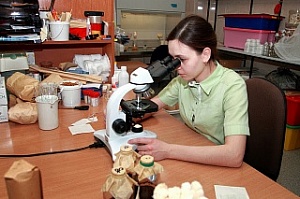Researchers of the Biological Institute have identified a strain of bacteria AZ-D10, which helps plants to absorb nitrogen from the air. In addition, the bacteria produce growth stimulating substances and biofungicides, impeding the development of fungal diseases.
- Nitrogen is one of the most important fertilizer element for the plants, without it the synthesis of amino acids and thus of proteins is impossible, - says Olga Vajshlja, assistant professor of Vertebrate and Ecology Department, Director of Research and Innovation Centre Planta. - Despite the fact that the content of nitrogen in the air is 78%, and about 80 thousand tons of nitrogen is contained over every hectare of land, it is a deficient fertilizer element.
The fact is that the molecular nitrogen of the air N2 is not absorbed by plants. They can absorb it only from ammonia or nitrates. In nature, only bacteria are capable for nitrogen fixation. Scientists of the Biological Institute have learned to use this natural mechanism. They have identified a strain of bacteria AZ-D10, which settles on the roots of plants, providing them with the delivery of ammonia nitrogen, auxin and cytokinins, biotin, pantothenic acid, and other valuable substances.
In addition, biologists have identified strains of the Pl-04bacillus, mobilizing phosphorus and silicon of the objects of the lithosphere. Both novices were resistant to the action of pesticides used in farms during chemical weeding. Based on their own two strains and the strain acquired in the Russian National Collection of Microorganisms, scientists have created a unique product "BioVays" in dry form. Microbiological fertilizer works as a nutritional supplement equalizing disharmony of nutrition of the plants in poorly fertile soils. The live cells of bacteria inhibit the growth of many types of fungal pathogens: powdery mildew, root rot, scab, fusarium, and botrytis.
- Today all civilized countries are seeking to move away from the use of chemicals and switch to agricultural biotechnology, - says Olga Vajshlja. - In Russia, farmers are also gradually come to understand that soil is a living filter of the biosphere, which can be maintained by introducing improves soil microorganisms.
Scientists of the Biological Institute have learned how to cultivate bacteria on an industrial scale, while keeping their beneficial agro properties. It is very important in biotechnological production, because strains as prone to losing their qualities. Biopharmaceuticals require sensitive and competent treatment. Scientists of the Biological Institute teach this farmers in special seminars and training courses at TSU.

